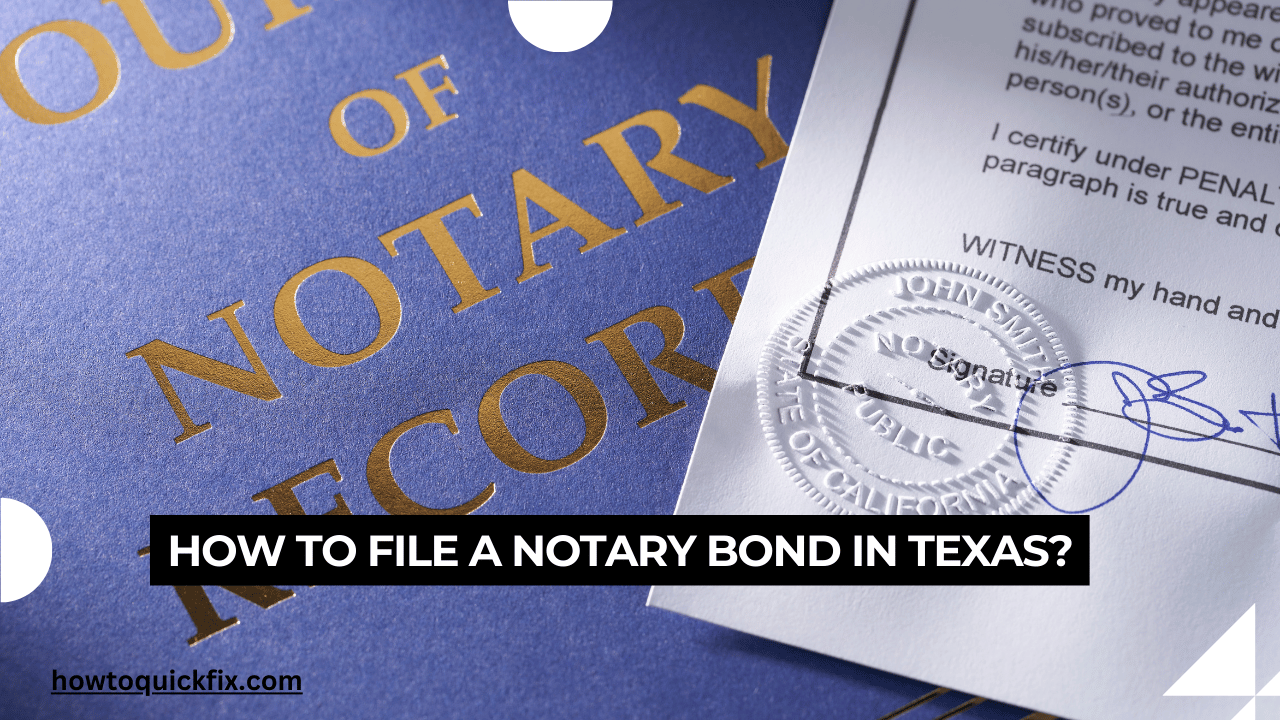Becoming a notary public in Texas is a critical responsibility that allows individuals to serve their communities and businesses by witnessing signatures, administering oaths, and performing other official acts.
But before you can begin notarizing documents, one important step is required: filing a notary bond. This process is necessary to ensure that you are acting legally and ethically as a notary.
The notary bond acts as a form of insurance, protecting the public from potential errors or misconduct you might commit during the performance of your duties.
While the concept of filing a bond may seem complicated, it’s actually a straightforward process when you know the proper steps. Whether you’re looking to become a notary or you need to renew your bond, this guide will walk you through everything you need to know to file your notary bond in Texas.
Contents
- 1 What Is a Notary Bond and Why Is It Required in Texas?
- 2 Step-by-Step Guide: How to File a Notary Bond in Texas
- 3 Common Mistakes to Avoid When Filing a Notary Bond in Texas
- 4 What Happens After You File the Notary Bond?
- 5 Maintaining and Renewing Your Notary Bond
- 6 Conclusion:
- 7 FAQ’s
- 7.0.1 How much does a notary bond cost in Texas?
- 7.0.2 Do I need to file a notary bond every time I notarize something?
- 7.0.3 What happens if my notary bond is canceled?
- 7.0.4 How long does it take to get approved for a notary bond in Texas?
- 7.0.5 Can I use a notary bond from another state?
- 7.0.6 What is the bond amount required in Texas?
What Is a Notary Bond and Why Is It Required in Texas?
Before diving into the process of filing a notary bond, it’s important to understand what a notary bond is and why it’s required in Texas.
A notary bond is a type of surety bond that ensures the notary public will carry out their duties correctly and ethically. In Texas, the bond protects the public from financial losses due to any mistakes or misconduct the notary might commit while performing their duties.
For example, if a notary improperly attests to a document or makes an error that causes harm, the bond would provide compensation to the affected party.
Texas law mandates that any notary public must file a bond with the state in the amount of $10,000 before they can begin notarizing documents. This bond helps ensure that notaries maintain high standards of professionalism and accountability.
Step-by-Step Guide: How to File a Notary Bond in Texas
Now that you understand the purpose of a notary bond, let’s go through the step-by-step process of filing one in Texas. This process is quite straightforward if you follow these clear steps:
Step 1: Obtain a Notary Bond
The first thing you need to do is purchase a notary bond. You can get the bond from various providers, such as insurance companies, surety bond companies, or through the Secretary of State’s approved vendors. The bond will typically cost you a fee, which is usually a small percentage of the $10,000 bond amount. Keep in mind that the cost can vary depending on the provider.
Step 2: Complete the Notary Application
Once you have the bond, the next step is to complete your notary application. This is a required document that you must submit to the Texas Secretary of State. The application will ask for basic information such as your name, address, and other personal details. The application form is available online through the Texas Secretary of State’s website.
Step 3: Submit the Application and Bond
After completing the application, you will need to submit it along with your notary bond to the Secretary of State. The bond should be in its original form and must be signed by both you and the surety company. The bond and application can be submitted either by mail or online through the Texas notary application system.
Step 4: Pay the Filing Fee
In addition to the bond, there is a filing fee that you will need to pay. The fee for filing your notary application in Texas is $21. This fee can be paid online using a credit card or by check when submitting the documents by mail.
Step 5: Wait for Approval
After your application and bond have been submitted, you’ll need to wait for approval from the Texas Secretary of State. The approval process usually takes around 5-7 business days, but it can be longer depending on the volume of applications. Once approved, you will receive your official notary commission and be authorized to begin notarizing documents in Texas.
Common Mistakes to Avoid When Filing a Notary Bond in Texas
Even though the process of filing a notary bond in Texas is relatively simple, there are a few common mistakes that applicants often make. Here are some mistakes to avoid:
1. Incomplete Application: Make sure that you provide all required information on your notary application. Any missing or incorrect details may cause delays in processing.
2. Not Using an Approved Surety Provider: You must purchase your notary bond from a Texas-approved surety company. If you purchase it from an unapproved provider, your application may be rejected.
3. Forgetting to Sign the Bond: Both you, the notary, and the surety company need to sign the bond. Failure to do so will result in a rejection of your application.
4. Submitting the Wrong Payment: Be sure to pay the correct $21 fee for the filing. Submitting a wrong amount could delay the approval process.
5. Missing the Filing Deadline: If you fail to submit your bond and application within a reasonable time frame, you may risk missing out on your notary commission.
What Happens After You File the Notary Bond?
After you file your notary bond and application, there are a few things to keep in mind during the approval process.
Once approved, the Texas Secretary of State will issue your notary commission. This commission is typically valid for four years. After receiving your commission, you will need to register your signature with the county clerk’s office and order your official notary seal.
In addition, it’s important to remember that your notary bond needs to be maintained and kept active throughout the duration of your term as a notary. If the bond expires, you must file a new bond to continue serving as a notary.
Maintaining and Renewing Your Notary Bond

As a notary public in Texas, you will need to renew your bond when it expires. Here’s what you need to know about renewing your notary bond:
- Your bond is valid for four years, but you should start the renewal process before the expiration date to avoid any lapses in your notary status.
- You will need to submit a new bond and a renewed application to the Secretary of State along with the required filing fee.
- Once your bond is renewed, you will receive an updated notary commission that allows you to continue notarizing documents for another four years.
It’s important to ensure that your notary bond remains active throughout your term to maintain your professional responsibilities.
Conclusion:
Filing a notary bond in Texas is a necessary step for anyone wishing to serve as a notary public in the state.
The process may seem overwhelming at first, but with the proper understanding of the requirements and steps involved, it becomes manageable.
Whether you are a first-time applicant or looking to renew your bond, the key is to stay organized and ensure that all documentation is accurate and submitted on time.
By following the outlined steps, you will be well on your way to becoming a licensed notary in Texas, contributing to your community and ensuring that important legal documents are properly notarized.
FAQ’s
How much does a notary bond cost in Texas?
The cost of a notary bond varies but typically ranges between $40 and $100, depending on the provider.
Do I need to file a notary bond every time I notarize something?
No, you only need to file the bond when you first apply to become a notary or when renewing your bond.
What happens if my notary bond is canceled?
If your bond is canceled, you will no longer be authorized to perform notarial duties until you obtain a new bond.
How long does it take to get approved for a notary bond in Texas?
The approval process typically takes 5-7 business days.
Can I use a notary bond from another state?
No, your bond must be issued by a Texas-approved surety to be valid for use in Texas.
What is the bond amount required in Texas?
The required bond amount for a notary in Texas is $10,000.








